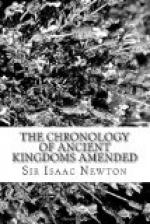When Joseph entertained his brethren in Egypt, they did eat at a table by themselves, and he did eat at another table by himself; and the Egyptians who did eat with him were at another table, because the Egyptians_ might not eat bread with the Hebrews; for that was an abomination to the Egyptians_, Gen. xliii. 32. These Egyptians who did eat with Joseph were of the Court of Pharaoh; and therefore Pharaoh and his Court were at this time not Shepherds but genuine Egyptians; and these Egyptians abominated eating bread with the Hebrews, at one and the same table: and of these Egyptians and their fellow-subjects, it is said a little after, that every Shepherd is an abomination to the Egyptians__: Egypt at this time was therefore under the government of the genuine Egyptians, and not under that of the Shepherds.
After the descent of Jacob and his sons into Egypt, Joseph lived 70 years, and so long continued in favour with the Kings of Egypt: and 64 years after his death Moses was born: and between the death of Joseph and the birth of Moses, there arose up a new King over Egypt_, which knew not Joseph_, Exod. i. 8. But this King of Egypt was not one of the Shepherds; for he is called Pharaoh, Exod. i. 11, 22: and Moses told his successor, that if the people of Israel should sacrifice in the land of Egypt, they should sacrifice the abomination of the Egyptians_ before their eyes, and the Egyptians would stone them_, Exod. viii. 26. that is, they should sacrifice sheep or oxen, contrary to the religion of Egypt. The Shepherds therefore did not Reign over Egypt while Israel was there, but either were driven out of Egypt before Israel went down thither, or did not enter into Egypt ’till after Moses had brought Israel from thence: and the latter must be true, if they were driven out of Egypt a little before the building of the temple of Solomon, as Manetho affirms.




